Ross-on-Wye
| Ross-on-Wye | |
| Welsh: Rhosan ar Wy | |
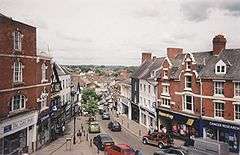 Town centre, looking north from Market House |
|
 Ross-on-Wye |
|
| Population | 9,574 (2011)[1] |
|---|---|
| OS grid reference | SO597241 |
| Unitary authority | Herefordshire |
| Ceremonial county | Herefordshire |
| Region | West Midlands |
| Country | England |
| Sovereign state | United Kingdom |
| Post town | ROSS-ON-WYE |
| Postcode district | HR9 |
| Dialling code | 01989 |
| Police | West Mercia |
| Fire | Hereford and Worcester |
| Ambulance | West Midlands |
| EU Parliament | West Midlands |
| UK Parliament | Hereford and South Herefordshire |
|
|
Coordinates: 51°54′50″N 2°35′13″W / 51.914°N 2.587°W
Ross-on-Wye (Welsh: Rhosan ar Wy[2]) is a small market town with a population of 9574 (according to the 2011 census), in south eastern Herefordshire, England, located on the River Wye, and on the northern edge of the Forest of Dean.
History

Ross-on-Wye was the birthplace of the British tourist industry. In 1745, the rector, Dr John Egerton, started taking friends on boat trips down the valley from his rectory at Ross. The Wye Valley's attraction was its river scenery, its precipitous landscapes, and its castles and abbeys, which were accessible to seekers of the "Picturesque". In 1782, William Gilpin's book "Observations on the River Wye" was published, the first illustrated tour guide to be published in Britain. Once it was published, demand grew so much that by 1808 there were eight boats making regular excursions down the Wye, most of them hired from inns in Ross and Monmouth. By 1850 more than 20 visitors had published their own accounts of the Wye Tour, and the area was established as a tourist area.
Parish church
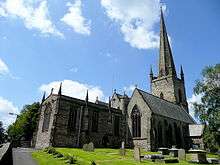
The 700-year-old parish church of St. Mary's[3] is the town's most prominent landmark and its tall pointed spire is visible when approaching the town from all directions.[4] The church holds several distinctive tombs, one of which – that of a certain William Rudhall (d.1530) – is one of the last great alabaster sculptures from the specialist masons of Nottingham, whose work was prized across medieval Europe. Rudhall was responsible for the repair of the almshouses, situated to the north west of the church, in 1575. Another tomb is of John Kyrle, a prominent figure in 18th century Ross, whose name is now given to the town's secondary school and after whom one of the town's notable inns, The Man Of Ross, is also named.
Plague Cross
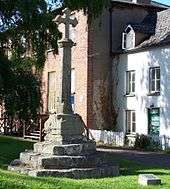
The Plague Cross, also known as the Corpse Cross, was erected in the church yard of St. Mary's church in 1637 as a memorial to 315 people who died in the town of the plague in 1637. They were buried nearby in a plague pit, at night and without coffins.[5] By 1896, the cross had fallen into disrepair and the top of the cross was missing. It was later restored to its former state.
The Prospect
The Prospect was created by John Kyrle and offers superb views over the Wye and to the Welsh mountains. The land was rented by John Kyrle from the Marquess of Bath in 1696 and turned into a garden and walking area.[6] In 2008, following heavy rain, Roman remains were discovered and excavated under the site.[7] It now contains trees (dedicated to local people), the V.E. Day Beacon and the War Memorial.
Present day
The town is known for its independent shops, picturesque streets and market square with its market hall.
Regular Thursday and Saturday markets are held at the red sandstone[8] Market House building[9] in the town centre, which was built between 1650 and 1654 replacing the older, probably wooden Booth Hall. The upper storey of the Market House now houses a Visitor Centre.
The town has not had a cinema since "The Roxy" in Broad Street closed its doors in 1985. The cinema site was purchased by Gateway Supermarkets for development.
Opposite the church, The Prospect is a public garden offering a view of the famous horseshoe bend in the River Wye, as well as views as far as the Black Mountains. The ruins of Wilton Castle, which lie to the west of the town, have now been restored and are open to visitors. The town has a number of sculptures created by Walenty Pytel, the left bank of the River Wye shows two of these. Despite the commonly held belief that both depict swans, one in fact shows ducks.
Politics and representation
Most local government functions are vested in Herefordshire Council, the unitary authority covering the county. Ross Town Council, which consists of 18 Councillors (six elected from each of three wards, Ross North, West and East), has the statutory responsibilities of a parish council The Mayor is Councillor Colin Gray.
Transport
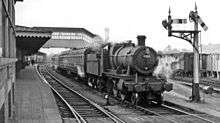
The former Ross-on-Wye railway station was a junction railway station on the Hereford, Ross and Gloucester Railway constructed to the north of the town. It was the terminus of the Ross and Monmouth Railway, which joined the Hereford, Ross and Gloucester just south of the station. Opened on 1 June 1855, on 29 July 1862 the line was amalgamated with the Great Western Railway, and in 1869 converted from broad gauge to standard gauge in a five-day period. A line to Tewkesbury was authorised by parliament in 1856, but was never built.
Closed under the Beeching Axe, the lines to Ross closed in stages, with the final closure in 1964.[10] The brick built station building has been demolished and the site redeveloped into an industrial estate, on which the brick built goods and engine sheds still stand.[11]
Today, although the nearest railway station is Ledbury on the Cotswold Line, Gloucester has a much better bus connection with Ross, and is a major interchange on the national rail network.
To the east of town is the end of the M50 "Ross Motorway" spur from the M5 motorway which links the area to the UK motorway network.
Sports
Ross-on-Wye is home to men's and ladies hockey clubs. The men's club fields two senior teams and were League champions in 2009/2010. Ross-on-Wye men's hockey club fields two Welsh international players.
Ross United F.C. and Woodville F.C. both ran senior football teams but in 1993 the clubs were disbanded, and Ross Town F.C. was established, which fielded the best of both teams. Ross Town F.C disbanded and in 2011 a senior men's team was added to Ross Juniors F.C. who had fielded only Junior teams until then.
Ross-on-Wye Cricket Club is the local cricket team, with Ross junior and senior teams. The U15s are Herefordshire county champions.
Ross Rowing Club has members competing in regattas all over the country. The rowing club has a junior programme and in August organises one of the largest club regattas in Britain.
Ross Running meets in The Hope & Anchor car park twice a week. It has its own run: the Monmouth to Ross 14 mile "River Run"
Climate
As with the rest of the British Isles, Ross-on-Wye experiences a maritime climate with cool summers and mild winters. A Met Office weather station provides long term climate data for the town.
| Climate data for Ross-on-Wye 67m asl, 1971-2000 | |||||||||||||
|---|---|---|---|---|---|---|---|---|---|---|---|---|---|
| Month | Jan | Feb | Mar | Apr | May | Jun | Jul | Aug | Sep | Oct | Nov | Dec | Year |
| Average high °C (°F) | 7.3 (45.1) |
7.7 (45.9) |
10.3 (50.5) |
12.9 (55.2) |
16.6 (61.9) |
19.3 (66.7) |
22.0 (71.6) |
21.5 (70.7) |
18.3 (64.9) |
14.2 (57.6) |
10.3 (50.5) |
8.1 (46.6) |
14.1 (57.4) |
| Average low °C (°F) | 1.8 (35.2) |
1.6 (34.9) |
3.2 (37.8) |
4.3 (39.7) |
7.1 (44.8) |
9.9 (49.8) |
12.1 (53.8) |
11.9 (53.4) |
9.7 (49.5) |
6.9 (44.4) |
4.0 (39.2) |
2.6 (36.7) |
6.3 (43.3) |
| Average precipitation mm (inches) | 80.7 (3.177) |
53.0 (2.087) |
51.2 (2.016) |
48.4 (1.906) |
49.2 (1.937) |
54.0 (2.126) |
34.8 (1.37) |
61.1 (2.406) |
63.7 (2.508) |
67.5 (2.657) |
64.5 (2.539) |
78.1 (3.075) |
706.2 (27.803) |
| Mean monthly sunshine hours | 49.9 | 67.5 | 107.3 | 149.4 | 189.4 | 188.1 | 211.4 | 193.4 | 137.1 | 98.6 | 67.2 | 45.0 | 1,504.3 |
| Source: Met Office[12] | |||||||||||||
Notable people
The dramatist Dennis Potter, most famous for The Singing Detective, lived in Ross from 1967. He died in 1994 at the age of 59.
Richard Hammond lives near Ross-on-Wye, as does ex-cricketer and pundit Shane Warne.
During the 1960s and early 1970s, Noele Gordon, actress in the Crossroads television soap opera, lived at the large white-washed country house called Weir End, near Ross, beside the A40 road to Monmouth. She is buried in St Mary's churchyard in the town.
Two founder members of rock band Mott the Hoople were from Ross-on-Wye. The band's drummer, Terry Dale "Buffin" Griffin, was born in the town on 24 October 1948, and bassist, Pete Overend Watts, moved there in 1960 at the age of 13 from Worthing. They met in 1961 at Ross Grammar School and formed their first band, The Anchors, that summer.
Twin towns
- Betzdorf, Germany
- Condé-sur-Noireau, France (since 1978)
- Namutumba, Uganda[13]
Gallery
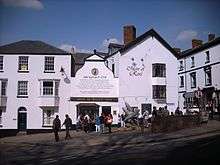 The Man Of Ross inn
The Man Of Ross inn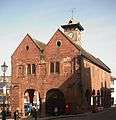 The Market House from the west
The Market House from the west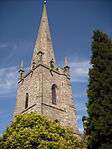 St Mary's Church spire
St Mary's Church spire View of the town from across the River Wye
View of the town from across the River Wye
See also
References
- ↑ "Town population 2011". Retrieved 20 November 2015.
- ↑ Welsh placenames in Herefordshire
- ↑ St Mary Ross-on-Wye, Herefordshire:: OS grid SO5924 :: Geograph British Isles - photograph every grid square!
- ↑ Ross-on-Wye from the Bypass:: OS grid SO5924 :: Geograph British Isles - photograph every grid square!
- ↑ "Local Monuments". Ross-on-Wye.com. Retrieved 2008-05-09.
- ↑ "The Prospect - The Garden". Ross-on-Wye. Retrieved 2013-06-15.
- ↑ "Ross-on-Wye Development - Prospect - Summary". Ross-on-wye.com. Retrieved 2013-06-15.
- ↑ Ross on Wye, Market hall:: OS grid SO5924 :: Geograph British Isles - photograph every grid square!
- ↑ Market House, Ross-on-Wye:: OS grid SO5924 :: Geograph British Isles - photograph every grid square!
- ↑ "Herefordshire Through Time - Welcome". Smr.herefordshire.gov.uk. Retrieved 2013-06-15.
- ↑ "The Railway in Ross - The Station". Ross-on-Wye. Retrieved 2013-06-15.
- ↑ "Caldecott 1961-90 averages". UKMO. Retrieved 9 November 2011.
- ↑ "Twinning". Ross-on-Wye Town Council. Retrieved 2010-06-20.
External links
| Wikimedia Commons has media related to Ross-on-Wye. |
 Ross-on-Wye travel guide from Wikivoyage
Ross-on-Wye travel guide from Wikivoyage- Littlebury's Directory, 1876-7
- Ross-on-Wye at DMOZ